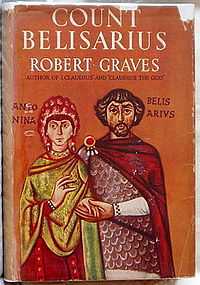Count Belisarius
| Count Belisarius | |
|---|---|
 | |
| Author | Robert Graves |
| Country | United Kingdom |
| Language | English |
| Genre | Historical novel |
Count Belisarius is a historical novel by Robert Graves, first published in 1938, recounting the life of the Byzantine general Belisarius (AD 500-AD 565).
Just as Graves' Claudius books (I, Claudius and Claudius the God and his Wife Messalina) were based upon, for example, The Twelve Caesars of Suetonius, Count Belisarius is largely based on Procopius's History of Justinian's Wars and Secret History. However, Graves's history has been criticized by at least one modern historian.[1]
Although the books based on Claudius use an autobiographical style, this work purports to be a biography written by Eugenius, a eunuch servant of Belisarius' wife Antonina. The novel covers the entire life of Belisarius, with the bulk of the text devoted to accounts of his life while on campaign in North Africa and Italy. Antonina was often with him during these years, and Graves uses stories about her connections to the court of the emperor Justinian and his empress Theodora to incorporate political intrigue and other information into the story of Belisarius' military exploits.
Graves' treatment of Belisarius is mostly respectful: the general is, if anything, hampered by his rigid code of honor and loyalty to his emperor. Other primary characters do not fare as well. Antonina and Theodora are presented as extremely intelligent, savvy, and capable individuals who are nevertheless prone to holding grudges and jealousy. Justinian is portrayed as intelligent but reckless, a tragically poor judge of character, and a spendthrift (even if driven by genuine piety). Graves recounts how Belisarius suffers trying to satisfy the whims of the two rulers, including the confusion following the command of Theodora, a monophysite Christian, to depose Pope Silverius. At the height of the siege of Rome, Belisarius has Silverius stripped of his vestments and exiled. An outcry forces Justinian to order him returned to Italy, but Theodora's replacement had already been instated. Silverius was intercepted before he could reach Rome and exiled once more. Belisarius, though he was just carrying out orders, was roundly condemned and built a small oratory at Santa Maria in Trivio in Rome as a sign of his repentance.
Notes
- ↑ Anthony Kaldellis, editor and translator of Prokopios, The Secret History, with Related Texts, 2010, ISBN 1-60384-180-6, p. lxxix: "There are many historical novels set in the early sixth century, but none can be recommended that are both historically accurate and well written. R. Graves' Count Belisarius... is at least well written."
Further reading
- Graves, Robert; Count Belisarius, Farrar, Straus and Giroux, (1982 paperback) ISBN 978-0-374-51739-7
| |||||||||||